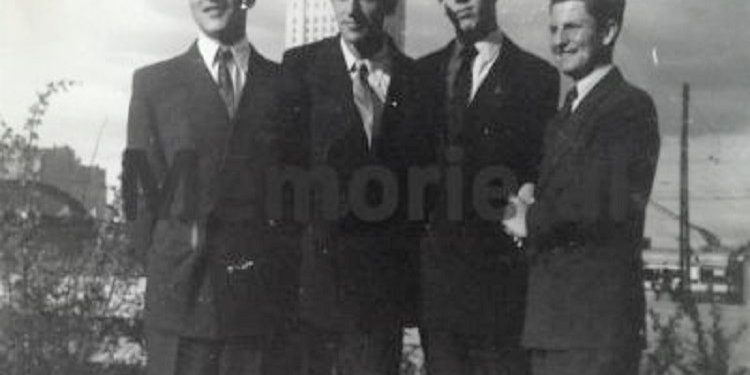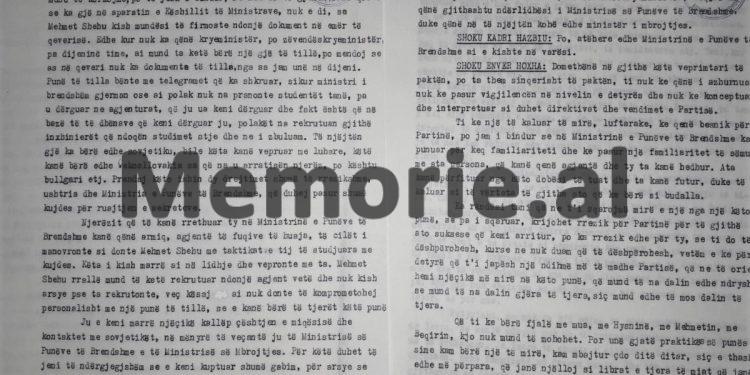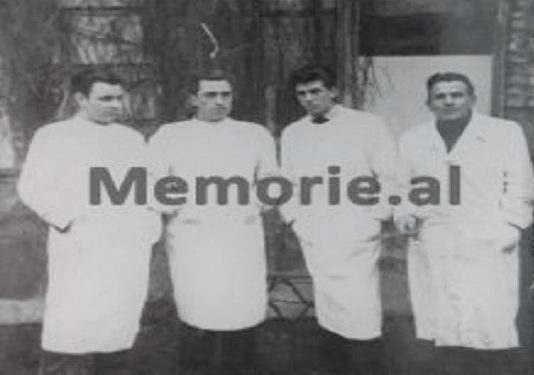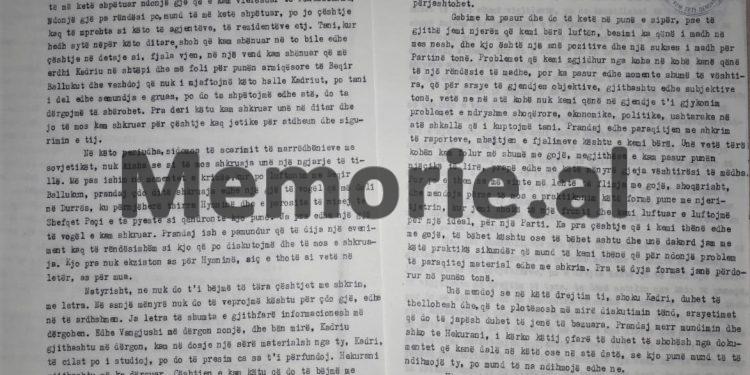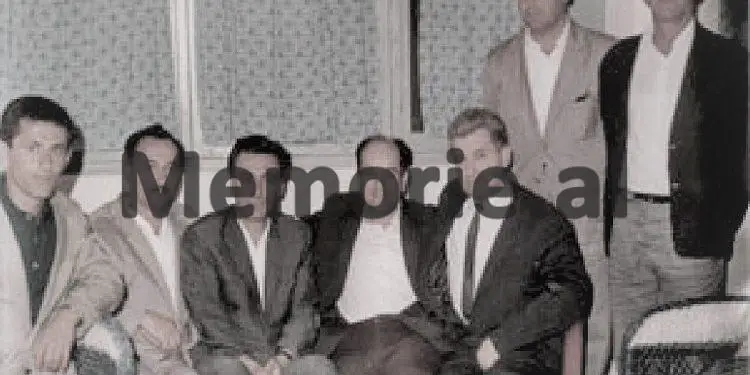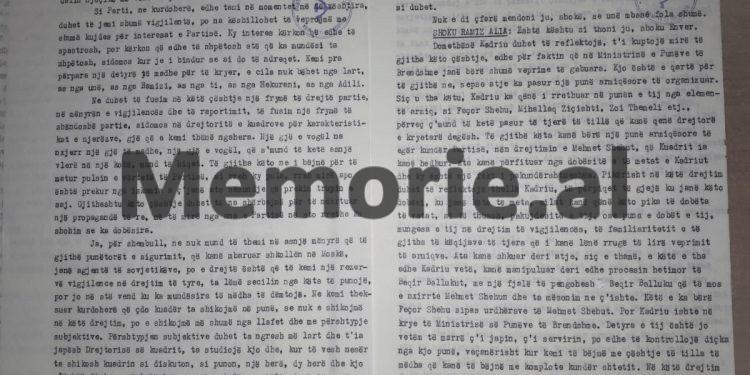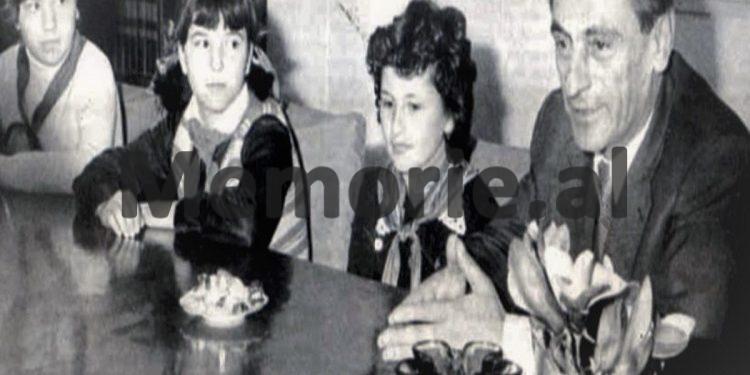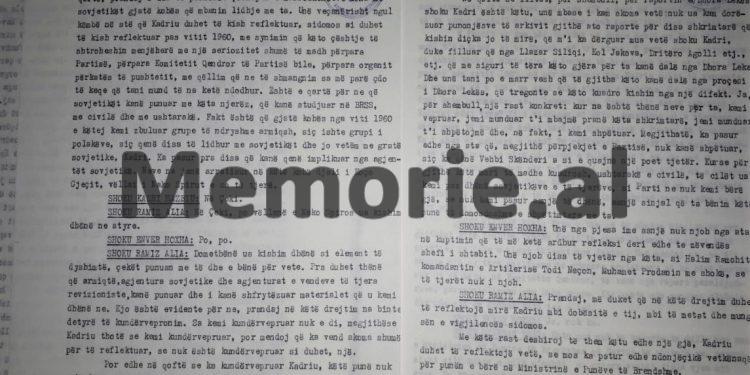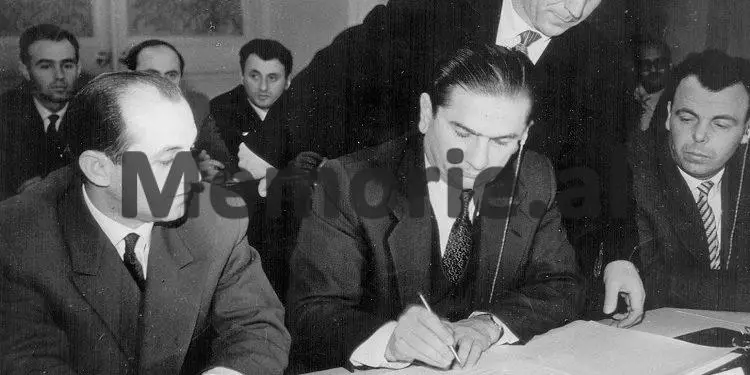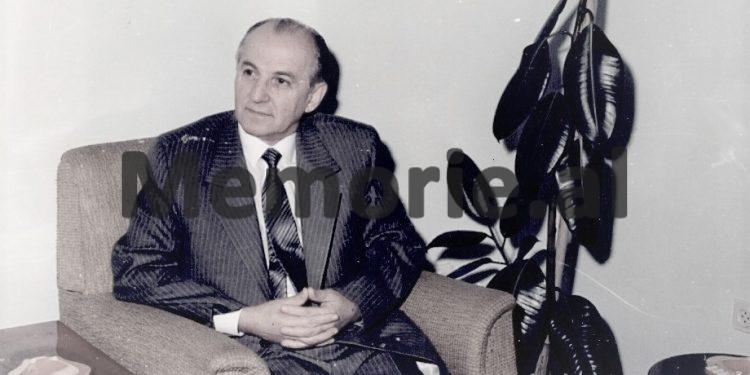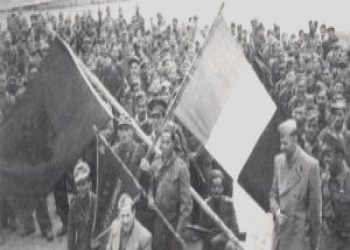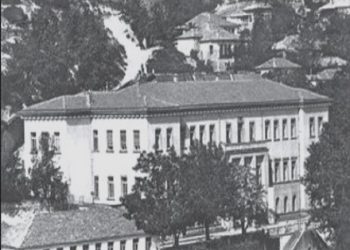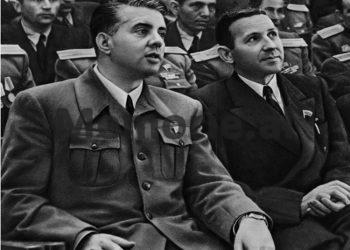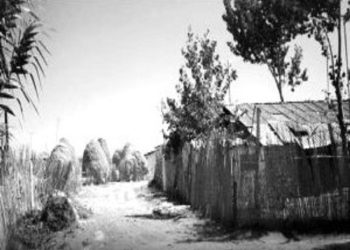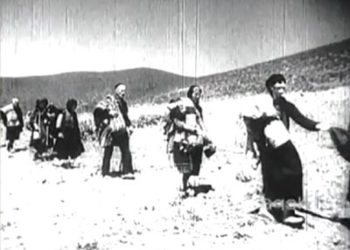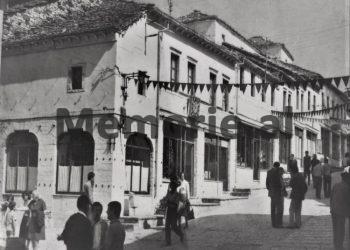Dashnor Kaloçi
Part fourteen
Memorie.al publishes some documents issued by the Central State Archive (fund of the former Central Committee of the ALP), where there is a voluminous file with archival materials which bear the logo ‘Top secret’, which belong to the period of years 1981-1982, with reports, reports, evidence, information, minutes of the meetings of the Politburo and the secretariat of the Central Committee of the ALP, etc., starting from what was held to review and analyze the self-criticism of the former Prime Minister Mehmet Shehu in December 1981, because he had allowed the engagement of his son, Skënder, “with a girl who had some political fugitives in her family circle”, the marathon meeting of the Politburo on the afternoon of December 17 his year that continued until the late hours of that night, where that problem was discussed with the debates and discussions of all members who “crucified” former Prime Minister Shehu, the meeting of the morning of December 18, after the news that Prime Minister Mehme t Shehu had killed himself, the marathon meeting of the Secretariat of the Central Committee of the ALP on September 20, 1982, with the topic: “Analysis of serious mistakes of Kadri Hazbiu, committed during the period when he was deputy minister and minister of Internal Affairs ”, where Enver Hoxha initially started accusing Kadri Hazbiu, luring him as a“ loyalist of the Party ”, (in order for him to“ open his heart to the Party ”, speaking against former Prime Minister Mehmet Shehu) , where at the beginning of his speech, Enver said: “After the coup in the army, we discovered the traitorous group in economics of Abdyl Këllez, Koço Theodhos and Kiço Ngjela with friends. We also discovered this group here; it was not discovered by the State Security. The same can be said about the discovery of the group of Fadil Paçrami, Todi Lubonja and a number of other people connected with them, such as Ismail Kadareja with friends, the Security did not reveal, but that hostile work was discovered by the Committee Central ”, etc.! All these and other documents with the logo ‘Top secret’, will be published in several issues in a row, exclusively by Memorie.al
Continued from the previous issue
The document ‘Top secret’ with the minutes of the meeting of the Secretariat of the Central Committee of the ALP, on the topic “Analysis of serious mistakes of Kadri Hazbiu, committed during the period when he was Deputy Minister and Minister of Internal Affairs”, held September 20, 1982
Top secret
MEETING OF THE SECRETARIAT OF THE CENTRAL COMMITTEE OF THE ALP DATE SEPTEMBER 20, 1982
COMRADE ENVER HOXHA: Such a document in the archives of the Central Committee, according to which you were ordered to give such materials to the Soviets. We can ask, if you are convinced, that it will not be found. If there is anything in the apparatus of the Council of Ministers, I do not know that Mehmet Shehu had the opportunity to sign a document on behalf of the government. Even when he was not the Prime Minister, but the Deputy Prime Minister, without my knowledge, he could have done such a thing; I think that there is no such document in the government, as far as I know.
He did such work with the telegrams he wrote, as if the German or Polish Minister of Interior did not accept our students, without sending them to the agencies that you sent to them, and the fact is that based on the data that you sent. , the Poles recruited us all the engineers, who studied there and we discovered them. The Soviets did the same; they even acted with lures, as did the Bulgarians, and so on. Therefore these were two very dangerous directions, the Army and the Ministry of Internal Affairs, which had to be very careful, to keep secrets.
The people who surrounded you in the Ministry of Internal Affairs were enemies, agents of foreign powers, whom Mehmet Shehu maneuvered as he wished, through his carefully studied tactics. He had taken these as connections and acted with them. Mehmet Shehu could rarely have recruited an agent himself and there was no reason to recruit him, besides, he did not want to be personally compromised with such a job, because others have done this job.
You have taken up the issue of friendship and contacts with the Soviets, in particular you of the Ministry of Internal Affairs and the Ministry of Defense. We should be aware of this, that you have misunderstood a lot, because the main agent was in the Ministry of Internal Affairs, later he went to the Ministry of Defense, where he took over the entire agency.
COMRADE RAMIZ ALIA: Even when he was prime minister, he was subordinate to both these departments.
COMRADE ADIL ÇARÇANI: He was related to them, of course.
COMRADE ENVER HOXHA: He had a relationship with them. Beqir Balluku has been related to him for some time, as Deputy Prime Minister, Beqiri has also been the liaison of the Ministry of Internal Affairs, being at the same time Minister of Defense.
COMRADE KADRI HAZBIU: Yes, then the Ministry of Internal Affairs, he was subordinate.
COMRADE ENVER HOXHA: I mean, in all this activity at least, to be honest at least, you have not been updated, you have not had vigilance at the level of duty and you have not properly conceived and interpreted the directives and decisions of the Party.
You have a good, militant past, you have been loyal to the Party, I am convinced that in the Ministry of Internal Affairs, family work has been bad and there has been a sick family life with those people who have been agents and you they threw it. They have taken advantage of these weaknesses of yours and introduced them, passing them on as true; they have all made you a fool.
It is important now that we explain these things one by one, because without clarifying them, there is a danger for the Party, for all the successes we have achieved, but there is also a danger for you, that today you despair, and we we do not want you to despair, it is only your duty to give a greater help to the Party, so that we may be better oriented in these matters, which may come to us differently, that other things may come to us, as others may not emerge.
That you talked to me, Hysni, Mehmet, Beqir, this cannot be denied. But during my internship I have done a good deed, I have kept a diary every day, as I said before, which are the same as my other books that have been published, but this is my internal diary.
COMRADE RAMIZ ALIA: Yes, yes, it is internal; nothing has been published from this diary.
COMRADE ENVER HOXHA: It is not like an external diary, which can also be published in several volumes. In this diary I have written every day, not only have I talked to one or the other friend, but I have also written what I have said and done. Now, when I look through these diaries, I see that I have written in them even issues in detail, such as, in a place I have written, that Kadriu came to my house and spoke to me about the hostile work of Beqir Balluku and I continue, that not these troubles are enough for Kadri, but now the woman’s illness is coming out, if we will save her too, we will send her to recover.
When we were fighting with Beqir Balluku, a small thing happened to me in Durrës, where I immediately called Hysnina and ordered her to go to Shefqet Peçi and ask him how this work was. Here is another small thing I wrote. This does not exist either for Hysnina, as he himself says in the letter, or for me.
Of course we will not do all the writing in writing. I think that in this direction, Comrade Kadri, you should go deeper and in order to better complete your discussion, the justifications you will give should be grounded. So take the trouble and go to Hekuran, ask him what you should see from the documents that have come out on this or that date, that this work can help you, but it can also help us.
We cannot say in any way that all the Security workers, who have finished school in Moscow, are agents of the Soviets, but it is right to have a reserve of vigilance in their direction, to let each of them work, but not in that place where there is a great chance of harm.
COMRADE RAMIZ ALIA: It is as you say, Comrade Enver. In other words, Kadriu must reflect, understand well all the issues and the fact that in the Ministry of Internal Affairs, many wrong actions have been done. As it was said here, Kadriu has been surrounded in his work by enemy elements, such as: Feçor Shehu, Mihallaq Ziçishti, Zoi Themeli, etc., except that there may have been others who were directors and heads of branches. . All of them have done a fierce hostile work against the Party, under the leadership of Mehmet Shehu, which they have thrown at Kadri.
They have taken advantage of Kadri’s weaknesses and shortcomings and this is an indisputable fact. In this regard, there has been and is a lot of carelessness on your part, Kadri, a lot of lack of vigilance, so the burden falls on you to find its source and how and how to understand this issue.
It is clear to us that the Soviets worked with these people, who studied in the Soviet Union, with civilians and the military. The fact is that during the period from 1960 onwards, we discovered various groups of enemies, such as the group of Poles, such as some associated with the Soviets and not only with Soviet women, Kadri. So there were some who were implicated by Soviet agents. Koço Gjeçi’s son, Nako Spiru’s brother, and some others escaped from us at this time.
COMRADE KADRI HAZBIU: In the Czech Republic.
COMRADE RAMIZ ALIA: In the Czech Republic, yes, Nako Spiro’s brother, we had given them.
COMRADE ENVER HOXHA: Yes, yes.
COMRADE RAMIZ ALIA: That is, we had given it to them as a suspicious element; the Czechs worked with it and did it for themselves. If we talk, for example, about the report of Dhora Lekë, comrade Kadri is here, I probably still have not handed over to the archive staff all those reports, about some writers who had something bad, that I Comrade Kadri sent me himself, starting from Llazar Siliqi, Kol Jakova, Dritëro Agolli, etc., that surely all these things came from Dhora Leka.
And I am now finding out that all these have come from the process of Dhora Lekë, which showed that these cadres had a defect. Here, for example, is a concrete case: when we were told about them, we acted, we tried to keep these writers close, we tried to save them, and in fact, we saved them. However, there were also those who, despite the efforts of the Party, did not escape, such as Vehbi Skënderi, or as they call another poet.
COMRADE ENVER HOXHA: For my part, I do not know any of them, in the sense that my reflex has even reached the Deputy Chief of Staff. I know some of these old people, like Halim Ramohito, the commander of the Artillery, Todi Naçon, Muhamet Prodanin with friends, that I do not know the others.
COMRADE RAMIZ ALIA: Therefore, it seems to me that in this regard, Kadri should reflect well on his weaknesses, shortcomings and lack of vigilance. On this occasion, I would like to say one more thing; Kadriu must reflect for himself, that there has not been a bit of complacency for the work done in the Ministry of Internal Affairs.
COMRADE ENVER HOXHA: Not only Kadriu, but we were also complacent, because we trusted him and said: Kadriu works and we had a sleeping mind from this side, while Kadriu, the least I can say, slept there.
COMRADE RAMIZ ALIA: The last thing I want to point out is that we can divide these issues into, so to speak, three stages. First, the hostile work that was done in the Ministry of Internal Affairs, until 1960, then after 1960, which in my opinion Kadriu should have reacted, in the way that was said, we have today’s stage.
Behold, we now have these documents, which were read here. I ask: what is Kadri’s attitude towards them? How does he assess these, that is, how does he assess this bad work that has been done in the Ministry of Internal Affairs? Where does he see his mistakes?
COMRADE HEKURAN ISAI: So there are no such reports from the Ministry of Internal Affairs, for the Party to see that, regardless of who is who is not, the word comes out that a group is coming. If you take what you also said, Comrade Enver, that all the groups were discovered from above, by the Party, while the Ministry of Internal Affairs, later made only arrests, Investigations, followed the trial of the enemies, etc., this is a lesson for us that we must keep in mind in the future.
COMRADE ENVER HOXHA: Adil Çarçani now finds a document that based on its content, told Mehmet Shehu that Lipe Nashja should be arrested and put in prison. Yes, if we leave it one more time, Mehmeti told him. Look at what Mehmet Shehu was doing, preventing his comrades from acting.
COMRADE HEKURAN ISAI: This attitude of Comrade Kadri, has brought many dangers, therefore he must be very aware of these attitudes. We now spend large sums of money outside, but in fact we have no discovery and about this very important problem, I have talked to friends.
COMRADE ENVER HOXHA: That’s right, today we have no Discovery, and our Discovery is gone.
COMRADE HEKURAN ISAI: We have no Disclosure, because Feçor Shehu, being an agent of Mehmet Shehu, must have given our agency to his masters. Comrade Kadri knows this better. So rebuilding your foreign agency now is a time-consuming and labor-intensive job. It is a colossal damage that has been done to our Discovery.
COMRADE ENVER HOXHA: And I am of the opinion that this sector, Counterintelligence, should no longer be linked to the Ministry of Internal Affairs, this is an organ of the Army. See what happens to us? They look like candies. We had hung both livers on Feçor Shehu’s neck. It seems to me and so it is right, that the whole world has organized this work in this way, they should not be led by one hand, Intelligence and Counterintelligence.
It cannot be the Army Security, subordinate to the State Security, because it is Hekuran in the Ministry of Interior. Here we are dealing with an important principle. The Army Security is a special body. Even the Soviets have it that way, they have the KGB, they also have the GRY, that is, the Army Security./Memorie.al
The next issue follows




